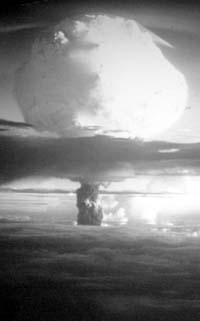
World Court Verdict:
Kill Nuclear Weapons
BY JOHN BURROUGHS



On July 8, the Court unanimously held that humanitarian law protecting civilians from the effects of warfare applies to the use of nuclear weapons. A fundamental rule, the judges found, is that "states must never make civilians the object of attack and must consequently never use weapons that are incapable of distinguishing between civilian and military targets."
Sitting in The Hague, Netherlands, and popularly known as the World Court, the International Court of Justice is the judicial branch of the United Nations, and the world's highest authority on questions of international law. The Court's decision came in response to a request by the U.N. General Assembly for an advisory opinion concerning whether the threat or use of nuclear weapons is permitted in any circumstance.
A large majority of the 14 justices hearing the case found that requirements of humanitarian and other international law generally prohibit the use of nuclear weapons. But the court also found that it could not "conclude definitely whether the threat or use of nuclear weapons would be lawful or unlawful in an extreme circumstance of self-defence in which the very survival of a state would be at stake."
This outcome presents at most a very narrow range of possible exceptions to the prohibition on the use of nuclear weapons. Uncertainty would arise only when a nation is actually and acutely at risk of obliteration by weapons of mass destruction or of imminent conquest by a state bent on genocide or enslavement.
Clearly ruled out, for example, is the use of nuclear weapons against a reputed Libyan chemical weapons plant, as recently threatened by the United States. Also plainly illegal under the Court's opinion are the U.S. bombings of Hiroshima and Nagasaki, which killed over 200,000 civilians 51 years ago this month in the first and only use of nuclear weapons in war. These actions unquestionably did not distinguish between military targets and civilians, nor was the survival of the United States at issue.
The Court's opinion carries an overriding theme that nuclear weapons are wholly incompatible with law and a sustainable global order. Read in this light, the reference to an "extreme circumstance of self defense in which the very survival of a state would be at stake" is simply a sober recognition that so long as the weapons exist, there will be a risk of their catastrophic uses whether legal or illegal.
As the Court president Mohammed Bedjaoui observed, "the existence of nuclear weapons is therefore a challenge to the very existence of humanitarian law." The only truly adequate solution, the Court recognized, is the elimination of nuclear weapons.
Referring to Article VI of the Nuclear Non-Proliferation Treaty, the Court unanimously held that all states are obligated "to pursue in good faith and bring to a conclusion negotiations leading to nuclear disarmament in all its aspects under strict and effective international control."
In connection with negotiation of the comprehensive test ban treaty, many nations have called for the opening of multilateral talks on reduction and elimination of nuclear arsenals. The United States could make a good start on fulfillment of its Article VI obligation by supporting, rather than blocking, this eminently reasonable proposal.
Operators of South CaroIina's nuclear bomb plant, the Savannah River Site, could do their part by not betting the area's future on resuming the nuclear arms race. SRS managers, as well as local politicians and business leaders, continue pushing for new, federally-funded bomb production missions, including a new facility to produce a radioactive gas, tritium, used in nuclear weapons, and a plant to provide a "surge" capacity for quickly producing a large quantity of plutonium pits for new nuclear weapons.
Global changes in recent years surely make these projects wasteful and, in light of the World Court's ruling, they appear counter to international law as well.
John Burroughs served as legal coordinator for the World Court Project, a coalition of nongovernmental organizations, at hearings held before the Court in November 1995. He is a member of the board of directors of the New York-based Lawyers' Committee on Nuclear Policy and is an attorney for Western States Legal Foundation in Oakland, CA.
The Court's opinion carries an overriding theme that nuclear weapons are wholly incompatible with law and a sustainable global order.

